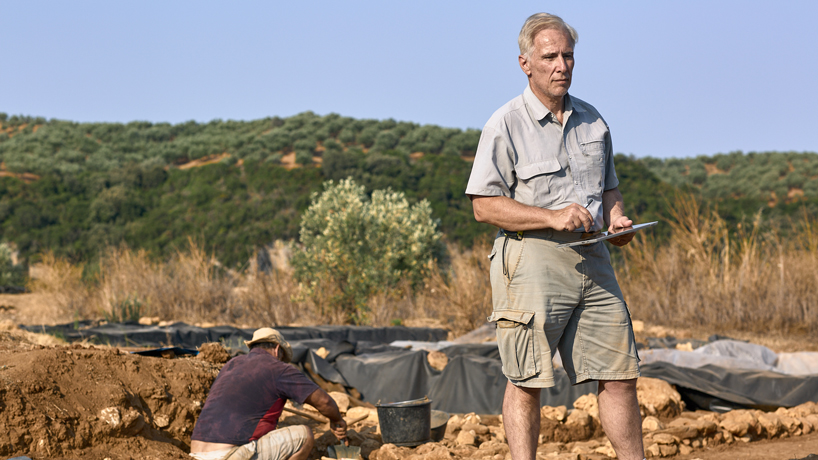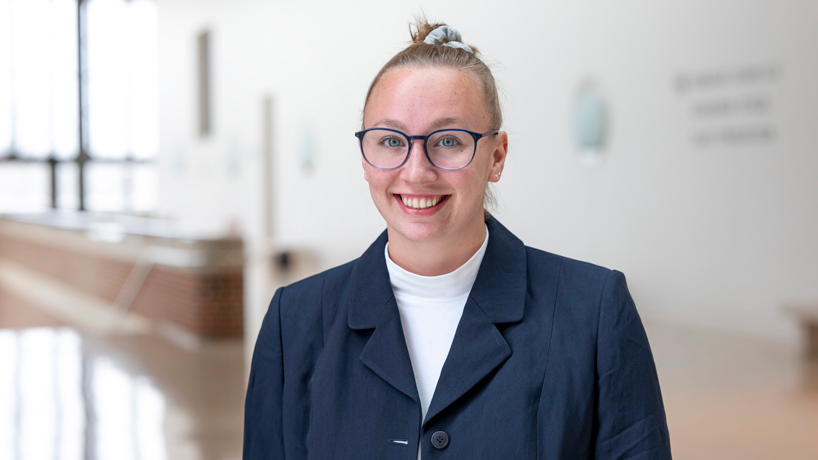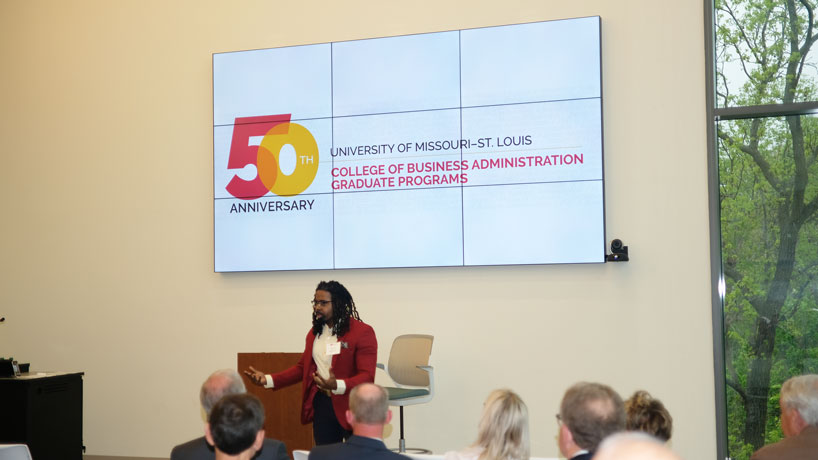Biology Professor Patricia Parker elected to American Academy of Arts and Sciences

Patricia Parker, the E. Desmond Lee Endowed Professor in Zoological Studies, was elected to the American Academy of Arts and Sciences. (Photo by August Jennewein)
Patricia Parkerwas ready to dismiss the message informing her of her election to theAmerican Academy of Arts and Scienceswhen it arrived in her inbox.
She figured it was the latest in a line of unsolicited emails inviting her to join different groups or to submit articles, often from journals with names she didn’t recognize.
但后来其他emails started showing up from people she did know, offering words of congratulations and admiration for some of her career accomplishments, and Parker, the E. Desmond Lee Endowed Professor in动物学研究at the University of Missouri–St. Louis and a senior scientist at theSaint Louis Zoo, began to reconsider.
她说:“我开始从现有成员那里收到消息,这些人是该领域的知名人,我意识到这是真实的。”“我感到震惊和自豪。”
美国艺术与科学学会welcomed 252 new members- 4月22日,包括进化和生态学的10个。
Founded in 1780, the academyhonors excellence and convenes leaders from every field of human endeavor to examine new ideas, address issues of importance to the nation and the world, and work together, as expressed in its charter, “to cultivate every art and science which may tend to advance the interest, honor, dignity, and happiness of a free, independent, and virtuous people,” according to its website.
Among its founders were American Founding Fathers John Adams, Benjamin Franklin, Thomas Jefferson and George Washington, andits membershipover the years has grown to include luminaries in a wide array of fields such as Ralph Waldo Emerson, Jonas Salk, Charles Darwin, Georgia O’Keeffe, Toni Morrison and Nelson Mandela.
Parker has enjoyed a long and distinguished career as an evolutionary biologist, working most frequently with avian populations. She has received more than $4 million in grants for research and other projects and has authored or co-authored 200 articles in peer-reviewed journals with collaborators from around the world.
She also has mentored 50 graduate students from 10 countries who have gone on to work in academia, with nongovernmental organizations or in policy-making positions during nine years as a faculty member at The Ohio State University and 21 years at UMSL.
Parker has been a member of numerous professional societies, including a fellow of theAmerican Ornithological Society,Animal Behavior Society,Academy of Science of St. Louisand theAmerican Association for the Advancement of Science.
The Jennings School District awarded Parker its Exemplary Education Partner Award for her work with the Collaborative Laboratory Internships and Mentoring Blueprint.
Among her many awards is the Order of Scientific Merit she received from the citizens of Galápagos in 2008, the Stephen J. O’Brien Award from the美国遗传学会同年,Saint Louis Zoo Conservation Awardin 2014, theBrewster Memorial Medalfrom the American Ornithological Society in 2016 and the Exemplary Educational Partnership Award from the Jennings School District, awarded last year but presented this April, for her work leading theCollaborative Laboratory Internships and Mentoring Blueprint.
帕克已经期待着年度入职周末,获得美国艺术与科学学院的最新荣誉。它计划于明年春天。
“My family wants to go,” Parker said. “My grandkids want to go. My sisters from all over, they want to go. So that’s going to be fun.”
The news of her election has also led her to reflect on all she’s accomplished since she was a student at the University of North Carolina, Chapel Hill, earning her bachelor’s degree in zoology in 1975 and her PhD in biology nine years later.
Parker spent six years as a visiting scholar and research scientist at Purdue University after earning her PhD. She worked frequently with longtime friendEllen Ketterson, a faculty member at Indiana University, and was one of the first people to take just-emerging genetic techniques and apply them to wild animal populations.
“We learned some very interesting things,” Parker said. “But I think, more than that, the characteristic that I’m proud of is having a sort of fearlessness that if there’s somebody in the world that is doing something, then I can do it too.”
她的专业知识,以及她愿意探索新途径的意愿,为与其他科学家的未来合作开了大门,首先是在普渡大学,然后是1991 - 2000年俄亥俄州立大学生物学教师的成员。
By the early 1990s, she started collaborating withJohn Faaborg, an ornithologist at the University of Missouri–Columbia noted for his research on Galápagos hawks. Parker conducted genetic testing to better understand the relationships between females and males living in polyandrous groups.
With their preliminary data, she and Faaborg eventually secured a国家科学基金会格兰特(Grant)为帕克(Parker)提供了第一次在1998年在标志性岛屿进行研究的机会。
Two years later, she came to UMSL to serve as the E. Desmond Lee Endowed Professor in Zoological Studies, a position that came with a dual appointment at the Saint Louis Zoo.
She’d been prepared to take her research in a different direction and, perhaps, to a different part of the world, but the Zoo supported her continued work in Galápagos through itsWildCare Institute.
“I really helped the zoo expand their studies in nature,” Parker said. “Not that they weren’t doing any, but they weren’t doing very many, and they weren’t doing them in a very organized way. But for me, that was new. I’m not a veterinarian. We just kind of worked together, and I picked up these skills, and we took another turn toward application of a new set of skills to a new set of problems.”
Parker, who also serves as the interim director of UMSL’s惠特尼·哈里斯世界生态中心, estimates she’s made about 30 trips to the Galapagos Islands, her research shifting to disease ecology with a particular focus on avian malaria.
In what she considers the most important adaptation in her career, Parker has put much of her attention over the past 15 years to opening access and building capacity among individuals who for too long felt cut off from working in science.
That began in Galápagos, where she helped train some of the Ecuadorians living in the islands to conduct health tests and do other research on the wildlife there.
After the killing of Michael Brown in Ferguson in 2014, Parker found herself motivated to unlock opportunities for students much closer to the UMSL campus who’d been marginalized.
The CLIMB program has been providing paid internship opportunities to high-ability but low-opportunity students since its founding in 2015.
Parker created theCollaborative Laboratory Internships and Mentoring Blueprintor CLIMB program as a joint effort between UMSL and the Jennings School District. It has since expanded to serve students at大学城高的年代chool,Ritenour High Schooland河景花园高中.
The program provides a paid summer internship program for high-ability but low-opportunity students, who spend six weeks – 40 hours per week – working in research groups and getting hands-on lab experience in chemistry, biology, physics, psychology, education, mathematics and computer science.
“The big goal is to see them emerge with the confidence to know that whatever they decide to do, they can do it,” Parker said. “They just have to try hard, and they have to find the right people and establish the right relationships.”
Parker was lucky to grow up with a great sense of independence, much of it coming naturally to her as a middle child.
但是她在本科生的生涯中也加强了这一点,当时她突然退出学校,并在前往意大利的机票上花了最后300美元。帕克最终在那不勒斯的一个海军基地找到了工作,在她在欧洲旅行的时候住了一年,节省了两年的钱。
“I think that that did something to me that no matter what, I was going to be OK, and I could just do what was most interesting to me,” said Parker, who went back to North Carolina to finish her bachelor’s degree after the experience.
It’s why she was willing to take risks early on in her doctoral research as she studied vultures, and also why she’s been so willing to shift gears so often throughout her career since.
In that way, the American Academy of Arts and Sciences seems like the perfect organization for Parker to be part of.
“It’s arts and science,” Parker said. “It’s everything. It is not just focusing in on accomplishments or excellence or achievement or whatever in a particular area. It’s trying to get people who know how to do things from a variety of perspectives and get them together to potentially solve even larger problems. I think that is so cool.”
Short URL:https://blogs.umsl.edu/news/?p=89062











